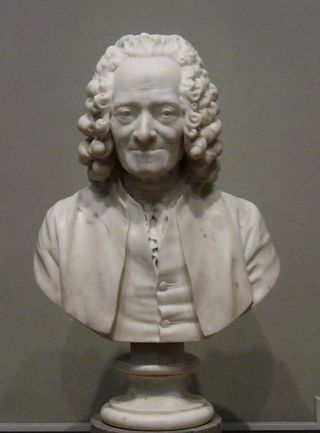
Continued from Part One
There are places on the net with less exacting standards, and they can be used by people with toxic political agendas to create verification of their political beliefs through false attribution to historical figures. For example, there is the much-cited quotation attributed to Voltaire—"To learn who rules over you, simply find out who you are not allowed to criticize."

The quote became a trending "quote of the day" in 2012, but is now believed to have originated not with Voltaire, but with White Supremacists in the same year. This "Voltaire quote" has circulated widely and has been used by both liberals and people on the right: for example by Donald Trump Jr in a tweet. Some variations of the meme design later introduced the Star of David, and in this way, anti-Semites managed to make it appear that they had the historical backing of Voltaire and the Enlightenment.
History becomes deliberately distorted through such processes, and there are no real safeguards to stop this happening on the net.
Then there is erasure through "Cyber-Mobbing"; this is when accusations or false accusations are made on social media that then lead to accused people being disgraced in their public and private lives, their social media accounts being suspended or shut down, their reputations and careers destroyed, and the history of their lives rewritten.
Many innocent people have been destroyed by this process, as was illustrated by the tragic tale of "Ana Meyer," who had her personal, sexual, and medical histories rewritten online by as many as 100 trolls who wrote posts that were "explicitly designed to make her unemployable."
Deliberate erasure extends beyond people that we do not agree with into facts we don’t like, as when a group of activists decided to "erase a scientist from history" on Wikipedia. Respected German paleontologist Günter Bechly (specializing in fossil dragonflies) was an atheist who then converted to Catholicism and became an outspoken proponent of Intelligent Design. His Wikipedia page was erased for a period of time, due to pressure from "editors," downgrading the value of his scientific work.
Certain activist types now build entire internet identities around silencing individuals that they hate online. And this rush to erase, this fear of letting enemies speak, leads to a reduction of the spaces in which history can debate. The internet has given disproportionate power to small but organized single-issue political groups intent on wiping people they target from digital history.
Then there is sensitivity censorship by social media, as when a post or account is deemed “too shocking, disrespectful, or sensational” for Facebook. As when Facebook blocked a fundraising video for The Wounded Blue, a charity for wounded police officers, from its platform. This sensitivity-censorship phenomenon has its offline equivalent in university and high school classrooms with trigger warnings—to protect sensitive students.
However, the idea that trigger warnings are an effective way to prevent sensitive or traumatized students from being disturbed has been thrown into doubt by a recent study from Harvard psychologists Payton Jones, Richard McNally, and Benjamin Bellet. In it, they found “substantial evidence that trigger warnings counter-therapeutically reinforce survivors’ view of their trauma as central to their identity." Trigger warnings and sensitivity censorship actually have the capacity to make trauma survivors more self-conscious and fearful.
The parts of history that some people might find distressing also can’t be separated from historical facts that people might find distressing because they clash with their own political bias. According to the Electronic Frontier Foundation, Facebook is complicit in working with foreign governments in censoring online content for political reasons, such as in the case of censorship of an unflattering image of the King of Thailand shopping with a mistress. So, facts and images get written out of history.
History itself is subject to the problem of Algorithmic bias and this leads to the state of "Eternal-Nowness" that we live with every day online. This is the biasing of internet algorithmic search results to what is new and what is popular in the now. What is trending? Since young people use the internet more, and young people have less historical knowledge, the algorithms consider The Kardashians and The Great British Bake Off to be of greater significance than the Great British debate between 20th-century economists Keynes and Hayek.
There is also nowness-bias due to the fact that the greatest thinkers in history were peer-reviewed in learned papers, not reviewed on vlogs and blogs, not liked or clicked; so, according to the algorithms, Beyonce is millions of times more important than Henri Bergson.
Thus, thinkers whose work has never been turned into a free-to-download digital file are simply getting lost from history, and news stories that predate digitization are getting lost, forgotten, or simply can't be accessed online. Unless the work of an author, philosopher, artist, or scientist is suddenly popularized and makes it into the digital world, then they are in danger of being lost from the internet.
Filter Bubbles on the net, caused by the “personalization” of our searches, and the suggestions we’re fed by algorithms that track our internet lives, also make sure that we only ever get the same picture of history and politics over and over again. The same view that our filter-bubble-buddies share.
It used to be that we believed the internet was a portal to everyone in the world; now, since personalization, everything you post or share is only seen by the group of about 10 of the filter-bubble-buddies with whom you are most regularly in contact. This tiny group of online friends is your "organic reach"—what Wired calls our "hyper-personalized tribes."
The shrinking of the organic reach and the shrinking size of our filter bubbles are a direct result of internet platforms attempting to monetize our content. If you want to reach a wider audience, break out of your filter bubble, and speak to more than 10 people, you now have to pay to "boost your post."
Objective history fragments under the force of internet personalization; we end up with historical narratives pre-selected for us, histories that make us and our top-10 filter-bubble-buddies feel good about ourselves. If I and my nine friends are interested in the radical politics of the 60s, that's pretty much all we'll be spoon-fed by the personalized net. We also receive history and politics info with pre-selected enemies whom we can hate with one click and share with our filter-bubble-buddies.
Even Bill Gates warned us about this. Our view of the world goes from being a glasshouse to a mirrored cube. Our view of history becomes that which backs up the attitudes we and our filter-bubble-buddies already have.
In this restricted historical worldview, we get fed news stories and opinions that are created to make us click more, so we get horror, controversy, and fear-mongering along the lines of exactly the same news subjects that we and our friends reacted to before. It’s not hard to see how political polarization and fear of people with different views from us can grow from this, and how filter-bubble personalized history leads to exaggerated, simplified, and biased views of history.
Sadly, this is the unintended result of the rather more trivial project, run by Internet monopolies, to personalize your feed to get you to buy more stuff. A recent study showed that 93 percent of companies see an uplift in sales as a result of personalization, while 88 percent of modern consumers now expect that their online activity will be personalized to their own tastes.
So personalisation won’t be going away anytime soon. It’s like we’re saying, “We trashed the entire system of political debate and messed up our knowledge of history, but hey, no worries, I just got recommended a great new pair of sneakers.”
With all these factors, we’re witnessing the slow demise of historical learning not by one single vast conspiracy but by a process of a thousand small deletions, omissions, and shrugs of the shoulders, as we move on to the next exciting thing.
But never mind, you can forget this too.
Now, what's next?




